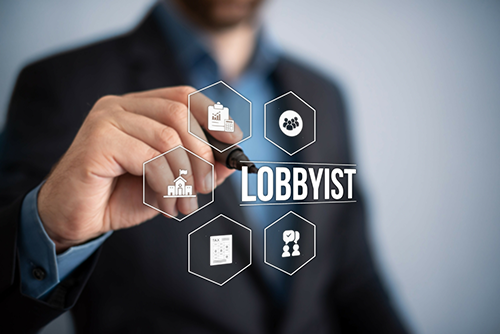
Unmasking the Tariff Controversy: How Trump’s Trade Policies Benefit Lobbyists.
Posted in :
Trump’s tariffs were meant to protect American workers, but they’ve exploded lobbying activity in D.C., enriching the elite and leaving small businesses and families to bear the cost.
The paradox of Trump’s tariffs, revealing how they inadvertently fuel a surge in lobbying activities that primarily benefit elite interests rather than the average American worker. It critiques the evolving political landscape and underscores the implications of cronyism in American trade policy.
Tariffs Fuel Corruption: How Lobbyists Profit While Americans Struggle
Imagine being a hardworking American farmer or a small business owner, struggling to make ends meet while the political elite in Washington are cashing in on the tariffs meant to protect you. You watch as the headlines promise that a new tariff strategy will revive jobs and strengthen the economy, yet all you see are mounting costs and dwindling profits. This is the reality for many as Trump’s trade war continues to reshape not only the landscape of American industry but also the very nature of political accountability in our country.
The Economic Divide: Lobbyists Thriving Amidst Tariff Chaos
The landscape of American lobbying has undergone a dramatic transformation. In the first quarter of 2025, lobbying expenditures related to tariffs surged to an astonishing $4.9 million. This is a stark increase from just $1.3 million in the same period of 2024. The numbers tell a compelling story. They reveal a system where the rich get richer, while the average American family struggles to make ends meet.
Explosive Growth in Lobbying
One of the most striking aspects of this increase is the sheer number of firms involved in tariff lobbying. The count skyrocketed from 89 to 212 in just one year. This is not merely a coincidence; it reflects a growing trend where businesses are increasingly turning to lobbyists to navigate the complexities of tariffs.
- 2024: $1.3 million in lobbying expenditures
- 2025: $4.9 million in lobbying expenditures
- Number of lobbying firms: Increased from 89 to 212
Why is this happening? As tariffs rise, so do the stakes. Companies are desperate to protect their interests. They are willing to spend significant amounts of money to influence policy. But who really benefits from this lobbying frenzy?
Impact on American Families
While lobbyists thrive, American families are facing a different reality. Rising costs are becoming a daily burden. Job cuts are rampant. The correlation between the increase in lobbying and the struggles of everyday Americans is undeniable. As businesses seek exemptions from tariffs, they often pass the costs onto consumers. This creates a vicious cycle where the average worker bears the brunt of these economic policies.
Joel Griffith from the Advancing American Freedom Foundation (AAFF) succinctly captures this sentiment:
“Trump’s tariffs have expanded the very swamp he promised to drain.”
This statement highlights the irony of the situation. The very policies intended to protect American workers are enriching lobbyists and deepening the economic divide.
Corruption in Plain Sight
The data from AAFF reveals a staggering 277% increase in trade lobbying expenditures. This is not just a statistic; it represents a shift in how businesses operate. They are no longer just competing in the marketplace; they are competing for political favors. This is cronyism at its finest.
Consider the case of Haas Automation, a California-based manufacturer. They publicly advocate for reduced tariffs on their raw materials while simultaneously pushing for higher tariffs on their competitors. This two-faced strategy is not unique. It’s a common practice among firms that can afford to hire well-connected lobbyists.
The Cost of Lobbying
Every dollar spent on lobbying is a dollar not spent on innovation or lowering prices for consumers. Small businesses, lacking the resources to engage in lobbying, are left to navigate these turbulent waters alone. They face the harsh reality of rising costs without the luxury of political influence.
As the lobbying industry flourishes, the American public is left behind. A recent Gallup poll indicates that a majority of Americans feel their financial situation is worsening. This sentiment is echoed across the nation. The chaotic nature of Trump’s tariff policies has eroded trust in the economy and exacerbated inequality.
A System in Crisis
In summary, the current state of lobbying in relation to tariffs paints a troubling picture. The increase in lobbying expenditures and the number of firms involved is alarming. It underscores a system that favors the wealthy and well-connected. Meanwhile, American families continue to struggle under the weight of rising costs and job insecurity. The question remains: who will hold these lobbyists accountable?
Cronyism in Action: The Two-Faced Tariff Strategy
The world of tariffs is often painted as a battleground for American workers. However, beneath the surface lies a different story. A story of cronyism, where the wealthy and well-connected thrive while the average American struggles. This is the reality of the two-faced tariff strategy.
Examples of Dual Lobbying Tactics
Take Haas Automation, for instance. This California-based manufacturer has become a prime example of how firms utilize dual lobbying tactics for self-interest. They publicly advocate for reduced tariffs on their raw materials. Yet, at the same time, they push for higher tariffs on foreign manufacturers importing finished equipment. This strategy allows them to benefit from lower costs while simultaneously hurting their competitors.
Such tactics are not isolated. Many companies engage in similar practices. They lobby for exemptions that favor their operations while supporting policies that disadvantage others. It’s a classic case of “do as I say, not as I do.”
Political Donations and Tariff Exemptions
But how do these companies secure their desired exemptions? The answer often lies in political donations. Research from Lehigh University reveals a troubling connection between contributions to Trump-aligned PACs and the likelihood of receiving tariff relief. Companies that donate to these political action committees are significantly more likely to benefit from exemptions.
- Affluent businesses leverage their financial power to influence policy.
- They use lobbyists to navigate the complex political landscape.
- In doing so, they create a system where wealth translates into power.
This raises an important question: Is this fair? Shouldn’t policies be designed to benefit all, not just the wealthy few? The reality is that the political process has become corrupted. Wealthy companies have the upper hand, using their resources to shape outcomes in their favor.
The Implications of Wealthy Companies
As the lobbying expenditures skyrocket, the implications for the average American become clearer. While businesses like Haas Automation secure exemptions, small businesses without the same political clout are left to bear the brunt of rising tariffs. They face higher costs and must either raise prices or risk shutting down.
In a recent report, it was noted that lobbying expenditures on trade issues surged by 277% in early 2025 compared to the previous year. This dramatic increase highlights the growing influence of lobbyists in shaping tariff policies. The raw numbers tell a compelling story: $4.9 million was spent on tariff lobbying in just the first quarter of 2025, up from $1.3 million the year before.
As Joel Griffith from the Advancing American Freedom Foundation aptly stated,
“Although President Donald Trump popularized calls to ‘drain the swamp,’ his favorite policy tool, tariffs, has actually enlarged it and generated a massive financial windfall for K Street lobbyists while hardworking American families pick up the tab.”
The Cost of Corruption
Every dollar spent on lobbying is a dollar not spent on American workers or innovation. The system is rigged. Small businesses struggle to compete against those with deep pockets and political connections. They don’t have the luxury of high-powered lawyers crafting tailored exemptions behind closed doors.
As this shadow economy grows, the American people are left behind. A recent Gallup poll indicates that a majority of Americans believe their personal finances are worsening. The chaotic nature of Trump’s tariff policies, lacking transparency and consistency, erodes confidence in the economy and exacerbates inequality.
In this environment, the phrase “This isn’t policy; this is political bribery” resonates deeply. It encapsulates the essence of what is happening. The political process has been hijacked by those with money, leaving the average citizen to fend for themselves.
As the two-faced tariff strategy continues to unfold, it becomes increasingly clear that the system is designed to benefit the few at the expense of the many. The implications are profound, and the need for reform is urgent.
The Fallout: How Tariffs are Hurting the Average American
In recent years, tariffs have become a hot topic in American politics. They were introduced with the promise of protecting American jobs and industries. However, the reality is far more complex. Small business owners are facing tougher challenges than their politically connected counterparts. Meanwhile, consumer prices are rising, and many Americans feel their financial situations are deteriorating. This blog explores the fallout of tariffs on the average American.
Small Businesses vs. Politically Connected Firms
Small business owners are often the backbone of the American economy. Yet, they find themselves at a disadvantage in the current tariff landscape. Why is that? The answer lies in the power dynamics at play.
- Access to Resources: Politically connected firms have the resources to lobby for exemptions and favorable treatment. Small businesses, on the other hand, lack the financial clout to influence policy.
- Lobbying Expenditures: Recent data shows that lobbying expenditures on trade issues skyrocketed by 277% in early 2025 compared to the previous year. This surge indicates that well-connected firms are actively seeking to benefit from the tariff system.
As a result, small businesses are forced to absorb the costs of tariffs. They often have to raise prices or cut back on hiring. This creates a vicious cycle that stifles innovation and growth.
Rising Consumer Prices
One of the most immediate impacts of tariffs is the increase in consumer prices. Tariffs create inefficiencies in the market. When companies face higher costs for imported goods, they pass those costs onto consumers. This leads to higher prices for everyday items.
Consider this: when a manufacturer pays more for raw materials due to tariffs, they often raise the prices of their finished products. This means that families are paying more for essentials like food, clothing, and household goods. The burden falls disproportionately on those who can least afford it.
Public Perception of Financial Woes
According to a recent Gallup poll, a majority of Americans believe their personal finances are worsening. This sentiment is not unfounded. The economic strain caused by tariffs is palpable. Families are feeling the pinch, and many are struggling to make ends meet.
As one economics expert noted,
“Every dollar spent lobbying is a dollar not spent on innovation or American workers.”
This statement encapsulates the core issue. The money that could be used to support American workers is instead funneled into lobbying efforts that benefit a select few.
Long-Term Tactical Shifts for Businesses
Businesses are not just reacting to tariffs; they are also adapting. Many are forced to make long-term tactical shifts to survive in this new environment. Some companies are relocating production overseas to avoid tariffs altogether. Others are investing in automation to reduce labor costs.
This shift can have dire consequences for American workers. Jobs are lost, and communities suffer. The promise of tariffs to protect American jobs is becoming increasingly hollow.
The Bigger Picture: Economic Distress
The increasing economic distress of American families is a direct result of a system designed for the elite. Tariffs, which were supposed to level the playing field, have instead created a landscape where only the well-connected thrive. The average American is left to bear the burden.
As the gap between the wealthy and the working class widens, the question arises: who truly benefits from these policies? The answer is clear. It is not the small business owner or the average worker. It is the lobbyists and the corporations that can afford to play the game.
The Swamp Is Overflowing
In conclusion, the tariffs that were marketed as a means to protect American jobs have instead enriched lobbyists and deepened political favoritism. The average American is left to navigate a system that seems rigged against them. The promise of a fair economy has been overshadowed by the reality of cronyism and corruption.
As the American public continues to feel the effects of these policies, it is crucial to question the motives behind them. If tariffs were truly about protecting American jobs, they wouldn’t come with a multi-million-dollar lobbying price tag. The swamp isn’t being drained—it’s being weaponized.
TL;DR: Trump’s tariffs are intended to protect American jobs but have resulted in a corruption boom for lobbyists, exacerbating economic hardship for the average worker while benefiting the elite.
CronyCapitalism, AmericanEconomy, PoliticalCorruption, FarmersAndManufacturers, KStreetInfluence, LobbyingExpenses, TradePolicyImpact, EconomicInequality, AmericaFirst, TrumpTariffs,Trump tariffs, lobbying firms, trade war corruption, crony capitalism, Haas Automation, K Street lobbyists, American economy, small business tariffs, Trump trade policy
#CronyCapitalism, #TradePolicyImpact, #EconomicInequality, #AmericaFirst, #PoliticalCorruption, #FarmersAndManufacturers, #TrumpTariffs, #AmericanEconomy, #LobbyingExpenses, #KStreetInfluence,#TrumpTariffs, #LobbyingCorruption, #TradeWar, #CronyCapitalism, #SmallBusinessCrisis, #KStreet, #TariffLobbyists, #EconomicInjustice

